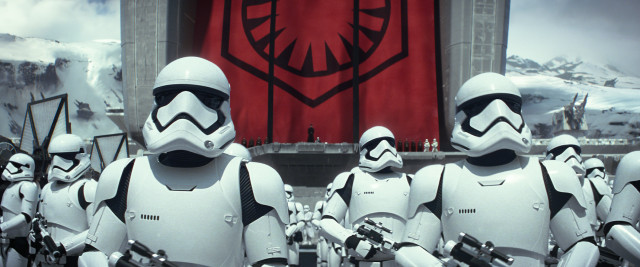warning: some mild Star Wars: The Force Awakens spoilers follow.
Even before its release, Star Wars: The Force Awakens was the subject of both critical praise (and racist hate) for its multicultural cast. But while the seventh chapter of Star Wars has been lauded for appearing more inclusive, the film ultimately suffers from some of the deeply conservative, even subtly racist tropes inherent to most big budget action movies—the same kinds of flimsy hero logic that provide the moral justification for racist “Stand your Ground” laws across many US states.
To understand this connection, let’s start with a recent article about Star Wars written by Aaron Bady in The New Inquiry. Bady writes:
[Finn the Stormtrooper’s] psychology makes no sense at all if you think even a little bit […] there’s something extremely unsettling about how easily he shrugs off a lifetime of indoctrination into a fascist death-cult, how quickly and painlessly he becomes one of the guys, just basically a good dude. […] Where is the ideological indoctrination (and psychological scar tissue) that would have accompanied being crassly made into biopower and canon-fodder?
Bady doesn’t quite go so far as to touch on the allegory of Finn-as-slave, though it seems like the filmmakers are rubbing it in our face. Finn (John Boyega) is a “rebel” stormtrooper who describes having been stolen from his family as a child to serve in the despotic First Order—a series of events that, in our own galaxy, we’d be apt to call “slavery.” The Star Wars movies have touched on slavery before—recall Darth Vader (formerly Anakin Skywalker) was a child slave, although as a white character serving an alien master, his character lacked the symbolic thrust held by a black character like Finn. (“Do race and racism exist in the Star Wars universe as they do in ours?” is a wholly different question, and one that is never really examined with any satisfaction).
Later, Bady notes something more unsettling, namely, Finn’s willingness to kill:
We don’t see a trace of esprit de corps within The First Order, because if we did—or if Finn still identified even a little with his fascist family—then it might have been difficult for him to kill dozens or hundreds or millions of them, and our pleasure in the spectacle might have been interrupted.
This is a common conundrum of Star Wars: morally, “it makes no sense if you stop and think about it,” as Bady writes. The audience is told to see Finn as a good guy for escaping the First Order; and then moments later, he turns around and shoots and kills stormtroopers in pursuit—his former brothers in arms—with no apparent qualms.
What are we to do with figures like the pacifist stormtrooper who reclaims his humanity because he refuses to kill, and who then goes on to kill dozens (or hundreds) of nameless stormtroopers because, as stormtroopers, they aren’t quite human?
A similar moral quandary arises when Luke refuses to kill his father at the climax of Return of the Jedi, because he knows “there is good in him still”: when Darth Vader proves Luke right, and turns good, he does it by killing the emperor, his own father-figure.
When posed this way, Darth Vader’s murder of Palpatine, like Finn’s murder of multiple attacking stormtroopers, appears not to make any moral sense. Yet in the moment, in the theater, they make sense to us, perhaps because we are instructed by the soundtrack and cinematography what to feel.
Compared to recent events in the United States, these murderous events do hold up to the logic of Stand Your Ground. Indeed, it’s almost like the Star Wars universe, like the Marvel universe and many action movie worlds, are all “Stand Your Ground” universes.
Consider: the Jedi are licensed to kill anyone who seems like a threat to them at any moment, and retain their Jedi “goodness.” They are both judge and executioner in one. The personal lives or families of any of their aggressors are thrown out the window. If the Jedi’s enemies haven’t renounced their employer’s values—presumably many of the dead stormtroopers are merely slaves or employees at work—they can be killed without qualm.
The Jedi of Star Wars fight a vast “other,” a horde, all of which are lumped together in a potpourri of evil. The stormtroopers are interchangeable from the perspective of the Jedi. Finn was a rare exception, the escapee, and because of this is redeemed. Yet the rest are tossed into a big lot of baddies.
It’s hard not to see a racial connection here. This is the same logic that let George Zimmerman off the hook for murdering Trayvon Martin. Many white folk in the United States lump all blacks into the same category, dehumanize them, and see them as a vast racialized “other.” This lumping-together and dehumanization is a general precept of structural racism, and the impetus for the cri de coeur of Black Lives Matter. The deaths of African Americans, at the hands of police and racist vigilantes like Zimmerman, don’t seem to phase the White Jedi, the moral good: hence, they keep happening over and over again.
One wonders if big-budget action movies are at least somewhat responsible for what you might call the “henchmen” effect. The hero—which the audience is always supposed to relate to—kills henchmen at will, and all of them end up as just a pile of anonymous bodies. Like Jedi and Sith, most police reduce citizens into “good” and “bad,” either in need of policing or lawful folks. The Henchmen effect plays into right-wing ideas about inherent qualities in people that make them successful versus failures, rich or poor, rather than call out the social problems, oppression and blatant inequality that make us who we are.
Imagine being stolen from your family at birth and made to work for an oppressive Empire. (This probably isn’t too hard for anyone who has slave ancestors.) Now imagine having your death cheered, despite the fact that you never had a choice of profession in the first place. This is a world in which the hordes’ lives don’t matter. The stormtroopers’ lives don’t matter. In an action film, no one’s lives matter except the hero.
This dehumanization is intrinsic to the action movie trope. We have been acculturated to believe the strange logic of these fictional worlds of dehumanized hordes, whose deaths we cheer mindlessly. This is the same kind of binary mindset police and racist vigilantes occupy when they end black lives without a second thought.

